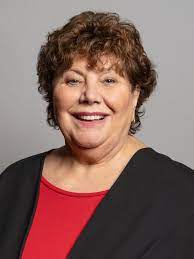The speech made by Marie Rimmer, the Labour MP for St. Helens South and Whiston, in the House of Commons on 27 January 2022.
I am truly humbled to speak in this debate today. I wish to pay tribute to and thank all speakers who have shared their family experiences and, in the case of the right hon. Member for Beckenham (Bob Stewart), their own experiences.
Bill, a constituent of mine and fellow parishioner who I went to church with, once asked to have a few words with me. He was one of those that walked into Belsen. He said, “There isn’t enough being said about it, Marie. I am worried that people will forget.” His wife was with him, with tears flowing down her cheeks. He said he could never, ever forget what they found when they walked into Belsen—the horrors and the inhumanity that the poor people there had been treated with. Bill never slept a single night without remembering horror stories and having nightmares. I said, “Let’s have a word with Father Martin”, the priest. He said, “Oh, I can’t do that.” I said, “Come on Bill—you owe it to those people that you found.” We had a word with Martin and said, “Can we have a mass and some talk about Belsen? It would perhaps help Bill if he shared some of his experiences.” We did that. Bill was so humbled but so thankful that he had done it. Bill is now at peace and resting. His wife said how he had never, ever slept one night in peace.
The holocaust is the greatest evil that mankind has ever inflicted. It was a systematic butchery of Jews, Gypsies, Roma, homosexuals, people with disabilities, and whoever else the Nazis believed were undesirable. In the grand scheme of things, it was not that long ago that this evil occurred. Many people are still alive today who survived the barbaric concentration camps. As someone born just after the war, I am always struck by how recent the holocaust still feels. During my childhood, more and more of the harrowing details and images became public. I can still remember learning about it for the first time and wondering how such evil could ever have existed. That is why it is so important to always remember how recent it was. Today we sometimes question how such evil could have occurred in the past, yet after the war people wondered how this evil could have occurred then. The 1930s and ’40s had television, music on the radio, and free elections with women able to vote. We are not talking about a historical event that occurred in the dark ages; it happened in the modern era. That is why, when we say “Never again,” we must mean it, and we must act on it. We have to guard against antisemitism and all forms of hatred that can fester wherever they exist.
I am grateful to the right hon. Member for Newark (Robert Jenrick), my hon. Friend the Member for Warrington North (Charlotte Nichols) and my right hon. Friend the Member for Barking (Dame Margaret Hodge)—one of the bravest women I know, and my very dear friend—for securing this debate. We must never forget the holocaust; it is the starkest, darkest and gravest reminder of what happens when evil, hate and prejudice are allowed to grow, and why we must stop it.
